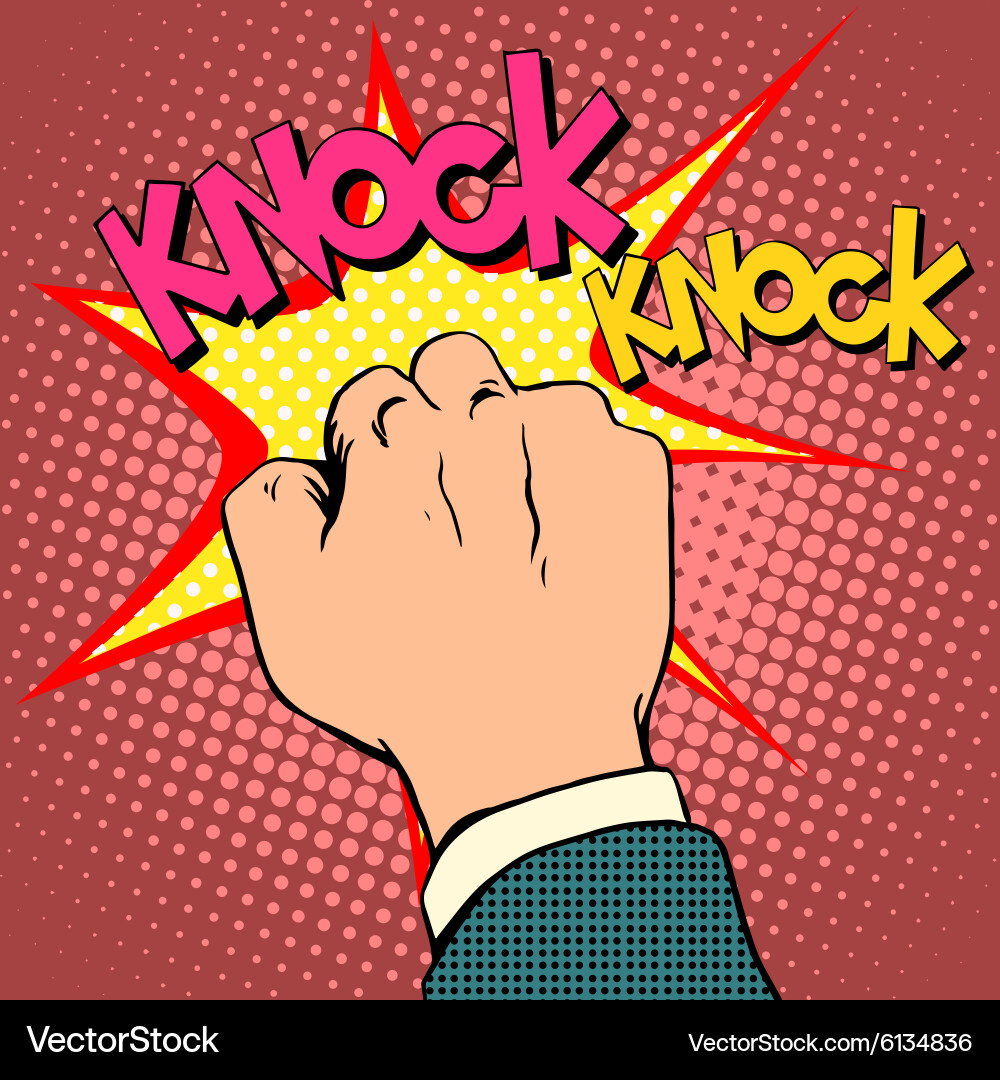Have you ever stopped to think about the simple act of a "knock"? It's more than just a sound, really. When you hear a thump on your door, someone on the other side is usually hitting it with their knuckles. That action, that sound, is a signal. It's about seeking entry, or maybe just getting attention, a way to show you are there. The general idea for "knock" is the action of striking a surface with some force, or a sharp sound that comes from it, usually to get notice, ask to come in, or show your presence.
This simple, universal gesture, this striking with a hard blow, is the start of a kind of joke we all know. It’s a very common way to begin a funny story, a little game of words that crosses many different places. You might wonder, does this playful way of starting a joke work the same way in other countries, like Germany?
Today, we're going to look into the world of German humor, particularly focusing on `knock knock jokes german`. We'll see if these playful exchanges are a big part of how Germans have fun with words, and how they might even help you get a better feel for the language and its people. It's a way to explore how humor travels, and how it changes just a little bit from one place to another, so you know, it's pretty interesting.
Table of Contents
- What is a "Knock"? Unpacking the Action
- Knock Knock Jokes: A Universal Form of Fun?
- Do Germans Tell Knock Knock Jokes?
- German for "Knock Knock": The Basics
- Trying Out German Knock Knock Jokes: Examples
- The Humor in German Jokes: It's a Bit Different
- Tips for Telling German Knock Knock Jokes
- Why Learn Jokes in German?
- Frequently Asked Questions
- Conclusion
What is a "Knock"? Unpacking the Action
The word "knock" itself has a lot of uses, actually. It means to strike something with a sharp blow, like when you hit a door. You might also use it to describe hitting someone very hard, so they fall over or become unconscious. For instance, the third wave was so strong it knocked me backwards, so it's a very powerful word.
It can also mean to repeatedly hit something, making a sound, or if an engine is making a noise, it is producing a knock. Sometimes, it means to be rough or brutal with someone. Or, you know, to just wander from place to place, like "met to knock around some ideas." The general idea for knock is the action of striking a surface with some force or a sharp sound, usually to get attention, ask to come in, or show your presence. So, when you hear a knock at the door, someone on the other side is thumping it with their knuckles. It's a striking with a hard blow, really.
Knock Knock Jokes: A Universal Form of Fun?
Knock knock jokes, they're pretty simple, aren't they? They follow a very clear pattern. Someone starts with "Knock, knock," and the other person says "Who's there?" Then comes the name or thing, followed by "____ who?" And finally, the punchline. This structure, it's almost like a little script, which makes them easy for anyone to pick up and understand, no matter where they are from, in a way.
They are often some of the first jokes children learn. This is because their setup is so predictable, and the humor often comes from a simple play on words or a silly surprise. You know, they are a great way to introduce kids to the idea of a joke, helping them understand how humor can work with language. It's a foundational type of humor, actually.
Do Germans Tell Knock Knock Jokes?
When you look into `knock knock jokes german`, you find something a bit interesting. While the idea of a "knock" is universal, and the structure of these jokes is known, they aren't quite as common or as deeply rooted in German humor as they are in, say, English-speaking countries. You know, it's not the first type of joke a German person might tell you, generally.
German humor, it tends to be a bit different. It often relies on wordplay, puns, or sometimes a dry, understated delivery. Jokes about everyday situations, bureaucracy, or even a bit of dark humor are more typical. So, while a German person would understand a knock-knock joke if you told one, they might not immediately think of telling one themselves. It's just not quite their usual go-to, apparently.
However, that doesn't mean `knock knock jokes german` don't exist. With the spread of media and cultural exchange, these jokes have certainly made their way into Germany. You can find examples, especially among younger generations or those who have spent time learning English. They are more of an adopted form of humor, in some respects, rather than a traditional one.
German for "Knock Knock": The Basics
So, how do you even say "knock knock" in German? The direct translation isn't quite the same. When you hear a knock at the door, you might say "Es klopft!" which means "It's knocking!" or "There's a knock!" You could also say "Klopf, klopf!" but it doesn't carry the same automatic joke association as in English, you know.
The typical exchange in a `knock knock jokes german` would usually go like this:
- Person A: "Klopf, klopf!" (Knock, knock!)
- Person B: "Wer ist da?" (Who is there?)
- Person A: [Name/Thing]
- Person B: "[Name/Thing] wer?" ([Name/Thing] who?)
- Person A: [Punchline]
This structure is very similar, almost identical, to the English version. The key is finding the right German words that can create a funny pun or a clever twist, and that can be a bit of a challenge sometimes.
Trying Out German Knock Knock Jokes: Examples
Let's try a few `knock knock jokes german` examples. Keep in mind that humor, especially puns, doesn't always translate perfectly. What's funny in one language might need a little explanation in another, or it might just not land the same way. But these can still be a lot of fun, honestly, and a good way to practice.
Here's one that plays on a common German name:
- Klopf, klopf! (Knock, knock!)
- Wer ist da? (Who's there?)
- Kurt! (Kurt!)
- Kurt wer? (Kurt who?)
- Kurtz vor der Tür! (Short before the door! - A play on "kurz vor der Tür," meaning "just before the door" or "almost at the door." "Kurtz" sounds like "kurz," which means "short.")
Another one, playing with a familiar sound:
- Klopf, klopf! (Knock, knock!)
- Wer ist da? (Who's there?)
- Mäh! (Baa!)
- Mäh wer? (Baa who?)
- Mährchen! (Fairy tale! - "Mährchen" sounds like "Märchen," which means "fairy tale." The "Mäh" sound is like a sheep's "baa.")
These jokes, they show how German can be playful, too. It's about finding those little sounds or word similarities that can make someone chuckle. You know, it's pretty clever when it works out.
The Humor in German Jokes: It's a Bit Different
German humor, it often has a reputation for being, well, serious. But that's not quite the whole picture. It's often more about cleverness and wit than slapstick or broad comedy. Wordplay is a big thing, and puns, or "Wortspiele," are very common. This makes `knock knock jokes german` a good fit in some ways, since they rely so much on wordplay, you know.
There's also a love for absurd situations and a certain kind of dry wit. Sometimes, the humor comes from the sheer unexpectedness of a statement, or a very literal interpretation of something. It's less about loud laughter and more about a quiet chuckle, or an appreciative nod, apparently. This is why understanding the cultural context helps a lot with German jokes.
When you try to understand `knock knock jokes german`, you're also getting a little peek into how the language itself works. You see how words can sound alike but mean different things, or how a phrase can be twisted for a funny effect. It's a rather neat way to pick up on those subtle language points, you know, that might be hard to get otherwise.
Tips for Telling German Knock Knock Jokes
If you want to try telling `knock knock jokes german`, here are a few things to keep in mind. First, practice the pronunciation. German sounds can be a bit tricky for English speakers, and getting the sounds right is pretty important for the pun to land. A slight change in how you say a word can completely change its meaning, and that's not good for a joke, you know.
Second, be ready to explain the joke. Since these jokes might not be as common, or the puns might be subtle, your audience might need a little help. A quick explanation of the wordplay can make all the difference. It's like, "Oh, 'Kurtz' sounds like 'kurz'!" That kind of thing. This makes it more of a shared experience, too, in a way.
Third, don't be afraid to try making your own. Once you get a feel for German wordplay, you might find it fun to create your own `knock knock jokes german`. This is a fantastic way to really get to grips with the language and its nuances. It shows you're actually thinking in German, which is a big step, you know. You can learn more about German language humor on our site, for example.
Why Learn Jokes in German?
Learning a language is about more than just grammar rules and vocabulary lists. It's about connecting with a culture, and humor is a huge part of any culture. When you learn `knock knock jokes german`, you're not just memorizing lines; you're getting a feel for the rhythm of the language, the sounds that go together, and the common phrases. It's a very engaging way to learn, honestly.
Jokes also help you remember words and phrases better. When something makes you laugh, your brain tends to hold onto it more firmly. So, a funny German phrase from a joke might stick with you much longer than a word from a textbook. It’s a pretty effective learning tool, in some respects. Plus, being able to tell a joke in another language is a great way to break the ice and connect with native speakers. It shows effort and a willingness to engage, which people usually appreciate, you know.
It also helps with listening comprehension. When someone tells you a joke, you have to listen carefully to catch the setup and the punchline. This sharpens your ear for the language and helps you pick up on natural speech patterns. It’s a kind of active listening practice, which is really beneficial. Discover more German humor here.
Frequently Asked Questions
People often wonder about `knock knock jokes german` and German humor in general. Here are some common questions:
Are knock knock jokes popular in Germany?
They are known, but not as popular as in English-speaking countries. German humor often leans more towards wordplay, satire, or dry wit. So, while people understand them, they might not be the first type of joke someone tells. It's a bit of an acquired taste, perhaps, or a newer form of humor there.
How do you say "knock knock" in German?
The direct translation isn't quite the same. You would typically start with "Klopf, klopf!" for the joke setup. When someone literally knocks, you might say "Es klopft!" or "Jemand klopft an!" meaning "It's knocking!" or "Someone is knocking!"
What are some common German knock knock jokes?
Common `knock knock jokes german` often rely on puns with German names or words that sound similar but have different meanings. The structure is very much like the English version, but the humor comes from German wordplay. An example might involve a play on a name like "Kurt" and the word "kurz" (short).
Conclusion
Exploring `knock knock jokes german` is a really fun way to get a feel for the German language and its culture. While these jokes might not be as common there as in other places, they still offer a great chance to practice your German and understand how humor works in a different setting. It’s a way to see that even simple jokes can open doors to deeper cultural insights. So, why not try telling one yourself, or even make up a new one? It's a very rewarding thing to do, honestly, and a great way to connect.



Detail Author:
- Name : Arlene Berge III
- Username : creichel
- Email : pkohler@flatley.com
- Birthdate : 2006-07-15
- Address : 4397 Ephraim Villages Boscohaven, WV 72553-6233
- Phone : +1 (540) 651-5060
- Company : Oberbrunner Ltd
- Job : Extruding and Drawing Machine Operator
- Bio : Magni temporibus ipsum laboriosam consequatur. Fuga provident ut totam voluptatem beatae ea. Deserunt minus laboriosam ratione assumenda id. Animi aliquam numquam rerum impedit et dolor neque.
Socials
facebook:
- url : https://facebook.com/agustinapowlowski
- username : agustinapowlowski
- bio : Quasi quia maiores et alias rem et hic illo.
- followers : 2179
- following : 2562
tiktok:
- url : https://tiktok.com/@powlowskia
- username : powlowskia
- bio : Dolorum vel ut est nulla aliquid qui. Et magnam optio magnam ut.
- followers : 5860
- following : 1540
instagram:
- url : https://instagram.com/agustina_powlowski
- username : agustina_powlowski
- bio : Et sed totam suscipit porro laudantium aut. Eius ab dolore enim placeat.
- followers : 4232
- following : 2543
linkedin:
- url : https://linkedin.com/in/agustina.powlowski
- username : agustina.powlowski
- bio : Distinctio nihil ducimus ut.
- followers : 1804
- following : 1914

